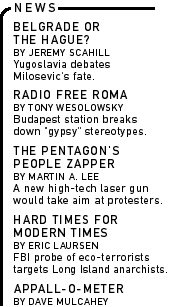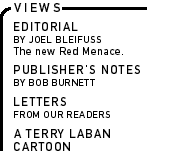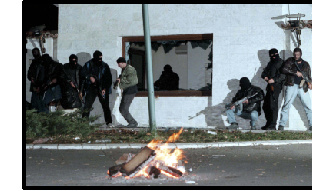

|

|

|

|
| |
|
|
|
For anyone closely following events in Yugoslavia since the elections that brought down Slobodan Milosevic last year, the timing of his arrest didn't come as a great surprise. The raid on his luxurious villa in the posh suburb of Dedinje began just hours before the deadline set by Washington, which demanded that the government arrest Milosevic or face losing $50 million in U.S. aid and access to hundreds of millions of dollars in loans from the International Monetary Fund. In the weeks leading up to the deadline, prominent politicians in Yugoslavia warned the country would face severe economic consequences if Milosevic were not arrested. But many analysts say the U.S. threats would not have materialized and that Serbia's leaders were aware of that. "The arrest was not just an effort to do the bidding of the United States," says Ljiljana Smajlovic, an expert on U.S.-Yugoslav relations for the Belgrade magazine NIN. "By arresting him on the hour set by Washington, it was meant to demonstrate an extraordinary zeal to do this bidding." Government officials deny any connection between the timing of the arrest and the
Milosevic is currently being held in the Belgrade Central Prison on charges of corruption and abuse of power. Representatives from The Hague war crimes tribunal recently delivered an arrest warrant for the former leader to the Yugoslav Justice Minister. Now the stage is set for a major battle over his extradition to the tribunal to face charges of crimes against humanity during the Kosovo war. The ruling coalition is divided on the issue, with the pro-West Serbian Prime Minister Zoran Djindjic advocating a handover and Yugoslav President Vojislav Kostunica opposing it. Many in Serbia want Milosevic prosecuted in Belgrade for what they view as his crimes against the Serbian people. Mirjana Savic, a 35-year-old postal worker says, "The Hague won't just put Milosevic on trial. It would turn into a witch-hunt against all Serb people." The current Yugoslav constitution forbids the extradition of its citizens. But Washington is once again attempting to call the shots. In a three-page document delivered by the U.S. Embassy in Belgrade to Kostunica and Djindjic, Washington "suggests" that following Milosevic's arrest, the government should draft a new law on cooperation with The Hague that "must not assert that the Federal Republic of Yugoslavia or Serbian courts have superior authority over the ICTY [The Hague]." The document, obtained by In These Times, also appears to call for stripping Kostunica's authority over extraditions. "The law should regulate only the procedures for cooperation," it says, "which must not be subject to executive or political approval, or intervention." Washington's demands on Yugoslavia stand in sharp contrast to U.S. policy opposing the establishment of an International Criminal Court. Nonetheless, pro-West legislators in Belgrade said recently they have finished drafting a law that would pave the way for Milosevic's transfer. They handed a copy of it over to a Hague delegation visiting Belgrade in early April, despite the fact that it has not been debated publicly in Yugoslavia. This was taken by some analysts in Belgrade as an indication of the country's depleting sovereignty. Most officials close to Djindjic concede they do not have the political consensus to pass the law, largely due to opposition from Milosevic's allies in the federal parliament from Yugoslavia's smaller republic, Montenegro. The Socialist People's Party (SNP) won all of Montenegro's seats in last September's federal elections because the government of President Milo Djukanovic boycotted the elections. The SNP has vowed to block passage of any law that would permit extradition. (However, some argue that no change in the law is necessary, since the tribunal is in international U.N. territory and thus not a foreign country.) Much in Yugoslavia will hinge on the outcome of the Montenegrin elections on April 22. Djukanovic has vowed to hold a referendum on independence should his separatist-minded coalition emerge victorious. If Montenegro breaks from Yugoslavia, Kostunica says new elections should be called in Serbia because the federation would cease to exist. "In that event, Serbia would represent a new state," he said, "making elections a logical outcome." But Djindjic, who has quickly consolidated his power while winning great praise from the United States and Western Europe, is adamantly opposed to the idea. Djindjic fears that Kostunica, out of a job as federal president, could threaten his grip on power. New elections would undoubtedly give Djindjic much cause for worry with his personal popularity ratings hovering in single digits. Kostunica, who now enjoys mass support, would certainly beat him in any fresh polls. For now, public sentiment in Serbia remains against The Hague, despite the documentaries on Milosevic's crimes and the infomercials for the tribunal broadcast regularly on Serbian TV. Such broadcasts were encouraged in Washington's memo to the Yugoslav government. "Help educate the Serbian people of the crimes against humanity committed by Milosevic and others," the document said. "Broadcast regular summaries of what goes on in trials at the ICTY." Milosevic's supporters have launched a campaign of demonstrations
outside the central prison. They have vowed to continue their protests
as long as the possibility of extradition lingers. As the political
power struggle plays out in Yugoslavia, Milosevic remains at the
center of the stalemate from an 8-foot- by-8-foot jail cell.
|


